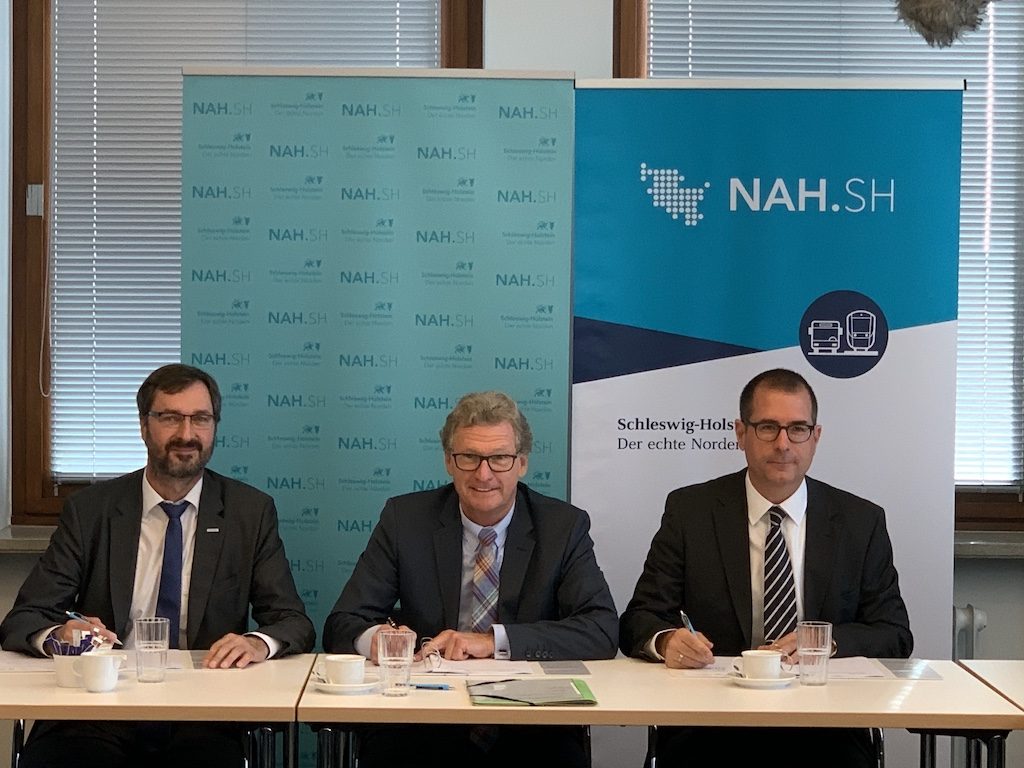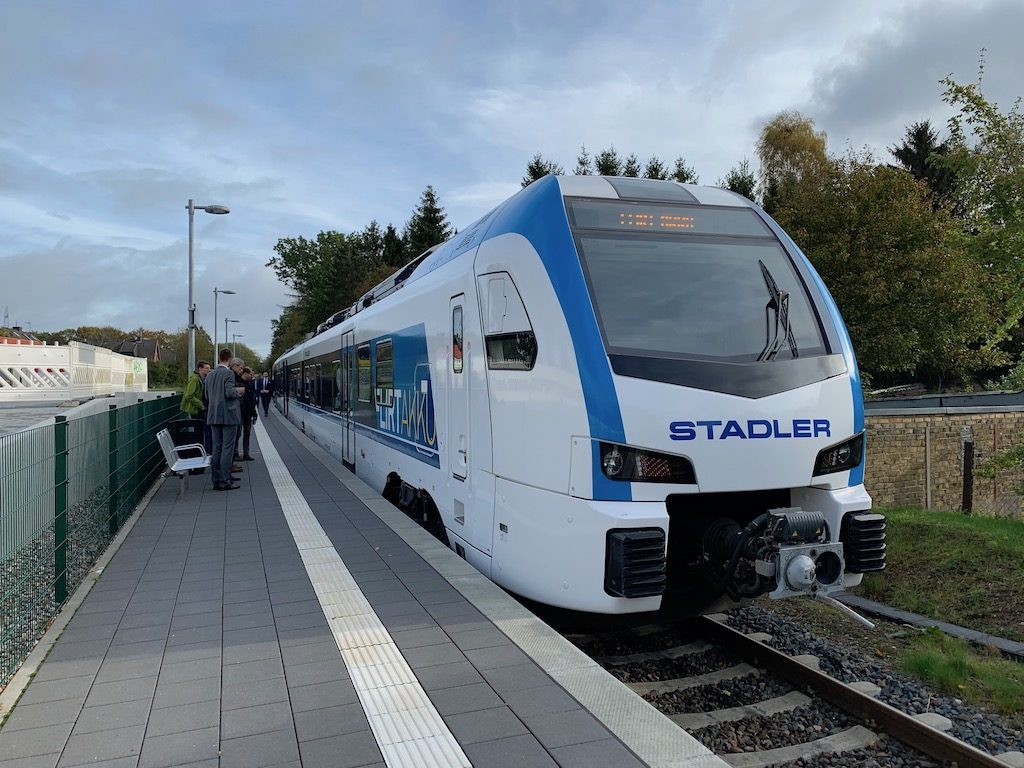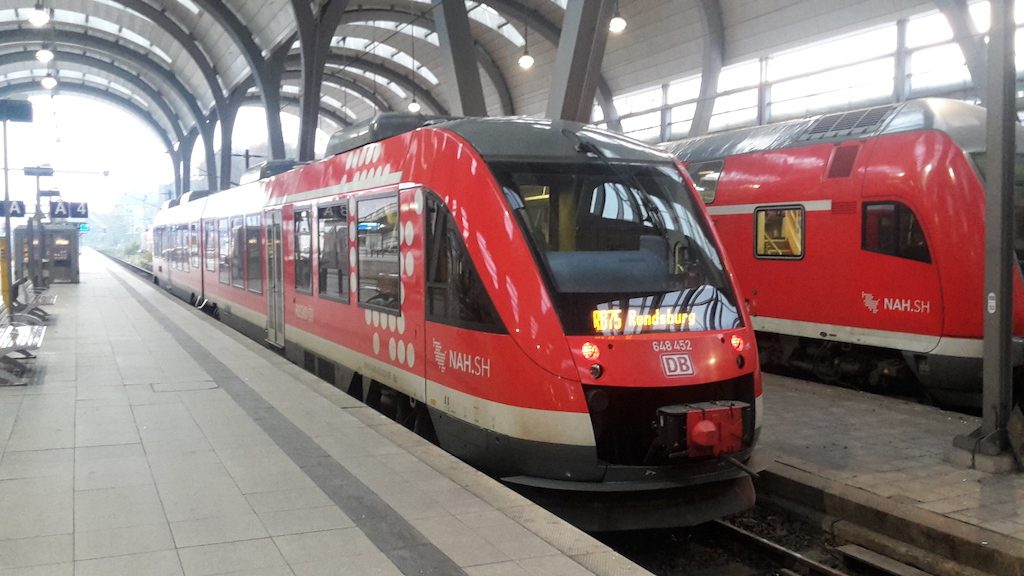
It is a real premiere for Germany, as from the beginning of the 1900’s until 1995, battery-powered trains used to be state of the art once. Thanks to the advancement of the lithium-ion technology, it is now possible to operate mainline regional trains with batteries. The land transport authority of the land Schleswig-Holstein in Northern Germany, NAH.SH and Stadler have signed the delivery contract for 55 emission-free battery trains on 14 October 2019. Stadler has already been announced in July as the winner of Germany’s first tender for emission-free regional trains. The FLIRT Akku battery trains will start operating at the end of 2022 on the currently diesel-operated lines. In addition to the delivery of the vehicles Stadler is responsible for the maintenance of the vehicles over a period of 30 years. The order value is around 600 million euros.
2-car train with 100 km range
Stadler reportedly supplied 55 two-piece FLIRT battery articulated railcars, which are recharged under the 15 kV 16.7 Hz AC catenary or other charging stations. The longest non-electrified section on the diesel network is 80 km. Under optimal conditions, however, a battery range of 150 km should be possible. The vehicles have seating capacity for 124 passengers. Stadler already put a prototype on the rails in 2018 for test and test purposes. This is a three-piece FLIRT battery railcar, which was first presented to the press in autumn 2018 and will soon be used on several non-electrified routes in Germany.
Tender took almost 3 years
After completing a bidding period which took almost three years, the NAH.SH tender is Germany’s first open tender for emission-free trains in Germany, with fuel cell, hybrid and battery trains competing against each other. With Alstom with its iLint fuel-cell train as one of the front-runners, Stadler eventually offered the most competitive offer which includes the maintenance of the fleet for a duration of 30 years. Stadler plans to carry out the maintenance at the Neumünster and Rendsburg sites.

Contract signing with (from left to right) Steffen Obst, sales director regional trains Stadler, Dr Bernd Buchholz, transport minister of Schleswig-Holstein, Jure Mikolcic, CEO Stadler Germany I © Stadler
Testdrive with the prototype
Following the signing of the contract, Stadler presented its FLIRT Akku prototype train to Schleswig-Holstein’s Minister of Transport, Dr Bernd Buchholz and other guests during a journey on the 7 km line from Kiel to Oppendorf. In comparison to the current diesel fleet, the battery trains offer a higher acceleration and even higher operational speeds of 160 km/h. The vehicles will be operated on the non-electrified routes with installed traction batteries. For recharging, either the existing or occasionally newly to be built overhead lines and other charging devices are used. By recuperating braking energy back into the battery, additional energy can be saved. From December 2022, the new trains will run on the routes Kiel – Lübeck – Lüneburg, Bad Oldesloe – Neumünster – Heath – Büsum, Kiel – Husum, Husum – Bad St. Peter Ording, Kiel – Rendsburg and Kiel – Eckernförde – Flensburg. With the commissioning of the FLIRT Akku multiple unit trains in Schleswig-Holstein, hardly any diesel railcars will be in service in Schleswig-Holstein.
Buchholz: «Die neuen Triebwagen sind emissionsfrei. Wir schaffen hier ein Stück der nötigen Elektrifizierung des Bahnverkehrs, ohne in die teuren Oberleitungen investieren zu müssen. Mich freut besonders, dass diese Lösung auch so wirtschaftlich ist. Über den Investitionszeitraum gerechnet liegen wir hiermit etwas günstiger als mit Dieseltriebwagen.»
Jure Mikolčić ergänzt: «Der heutige Vertragsschluss ist ein wesentlicher Meilenstein für die weitere Reduzierung der CO2-Emissionen im Schienenverkehr. Die Eisenbahn ist schon heute ein sehr umweltfreundliches Verkehrsmittel. Durch den Einsatz von lokal CO2-emissionsfreien Fahrzeugen auf nicht- elektrifizierten Strecken rückt das Ziel einer CO2-Neutralität ein grosses Stück näher. Wir freuen uns, mit der Lieferung der ersten Akku-Triebzüge für einen grossen Verkehrsvertrag aktiv zu dieser Entwicklung beizutragen.»
The tendering process was launched in August 2016 in order to replace the current diesel fleet on the East and West diesel networks. Apart from Schleswig-Holstein, also the regionals of Baden-Württemberg, North-Rhine-Westphalia, Bavaria and Saxony are planning to introduce battery trains into their regional rail network.
14.10.2019


